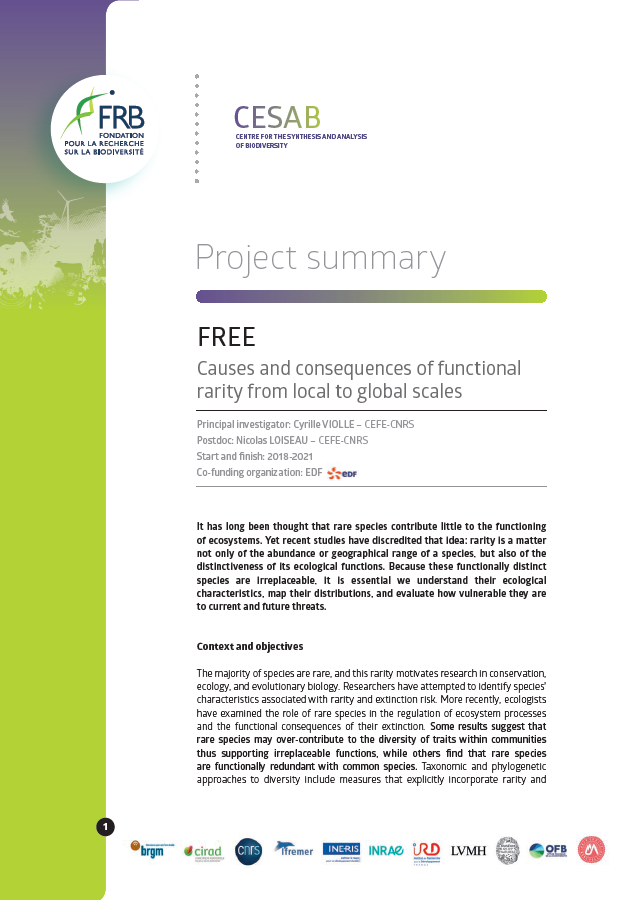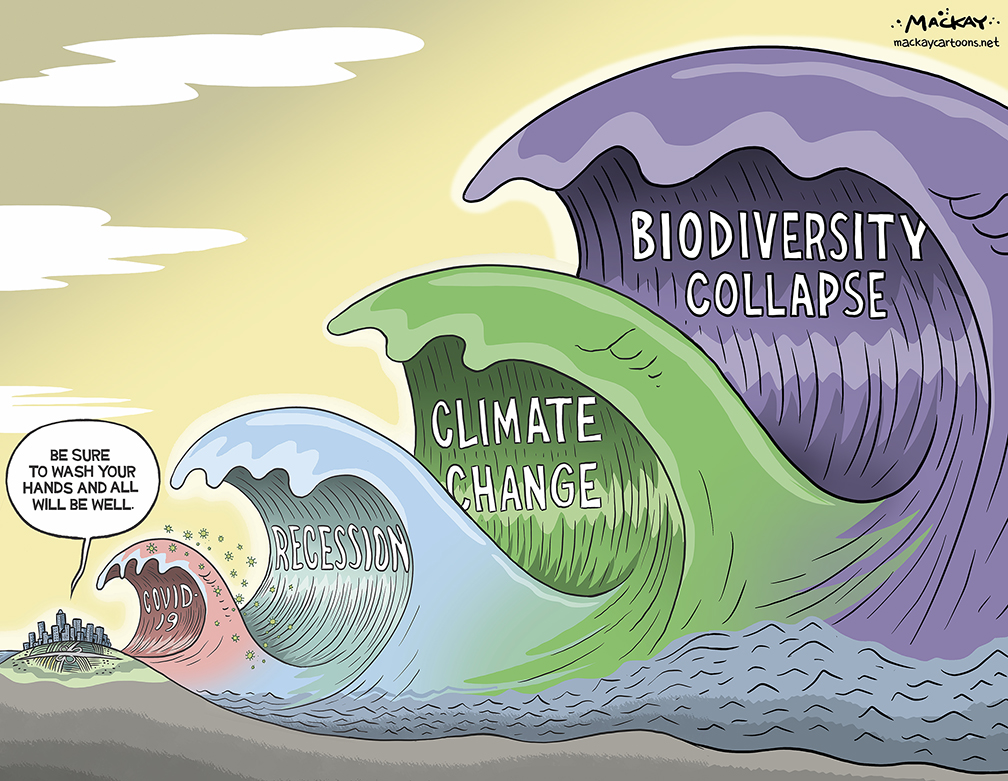![[FRB-CESAB] Data Toolbox for Reproducible Research in Computational Ecology – 2023](https://www.fondationbiodiversite.fr/wp-content/uploads/2019/12/logo-formation_web.png)
Pre-registrations for this training course are now closed.
Please beware, the number of places being limited, successful applications will be confirmed in September 2023.
The CESAB – Centre for Biodiversity Synthesis and Analysis – and the RT EcoStat organize the fourth edition of the training course “Data Toolbox for Reproducible Research in Computational Ecology”. The objective of this five-day course is to train young researchers in reproducibility, software development and version management tools (Git, GitHub, R Markdown, Quarto, renv, Docker), applied to biodiversity research.
This training will be given in French and will take place from November 20 to 24th, 2023 at CESAB in Montpellier. Its price is 150 € for the week – lunch included. Transportation, accommodation and evening meals are at the charge of the participants.
Find the training course on GitHub
List of speakers (in alphabetical order):
- Iago BONNICI (CNRS ISEM)
- Nicolas CASAJUS (FRB-CESAB)
- François GUILHAUMON (IRD Entropie)
- Aurélie SIBERCHICOT (UCBL LBBE)

Rarity has always fascinated conservation and evolutionary biologists with the goal to uncover species characteristics causing extinction risk. Recently, some results suggest that rare species may over-contribute to the diversity of traits within communities thus supporting irreplaceable roles while others show that rare species are functionally redundant with common species. Beyond the rarity of species, the rarity of functions played by species, coined as functional rarity, is thus key to understand the impact of biodiversity decline on ecosystem functioning. However, functional rarity still lacks a clear definition and a quantitative framework while its emergence and maintenance within communities is largely unknown.
The aim of the FRB-CESAB FREE 1 working group was to advance the concept of functional rarity and examine the causes and consequences of functional rarity from local to global scales.
This document summarizes in a few pages the group’s context and objectives, the methods and approaches used, the main findings, as well as the impact for science, society, and both public and private decision-making.
![[FRB-CESAB] Newsletter 5 CESAB – July 2021](https://www.fondationbiodiversite.fr/wp-content/uploads/2021/07/2020-03-11revised3-1.jpg)
A WORD FROM THE SCIENTIFIC DIRECTOR
We are living crazy times! The world is struggling with a major pandemic for more than a year, with dramatic consequences in terms of human lives lost and economic costs. But paradoxically, this crisis reduced (temporally) our impact on the planet, and thus might have also some positive consequences on biodiversity. Now that our economies are starting over, the question is now much we will have learned from the Covid crisis and its side-effects on the environmental crisis, so we do not go back to the business-as-usual GIEC scenario and end up losing on both sides.
The scientific community took the opportunity of the Covid crisis to experiment how science could be made through virtual interactions. Synthesis centers have been at the forefront of this “experimentation” as our core activity is to gather scientists from all over the world. We had to rapidly adapt to supporting fully virtual working groups and after a year we can conclude that virtual meetings, while providing a bridge during the pandemic, cannot replace intense, in-person immersion meetings (Srivastava et al., 2021). Science and particularly synthesis science is also about social interactions between people : these direct interactions fuel collective and creative thinking needed for groups to work on what is planned, and more importantly imagine the unplanned. But, as scientists and more importantly environmental scientists, we must be at the forefront of the paradigm shifts our societies need to go through, to mitigate the environmental crisis. We are thus thinking of re-organizing biodiversity synthesis centers in regional hubs where research teams within each geographic region could meet simultaneously as in-person working groups. These “regional hubs” would also coordinate virtually with each other among synthesis centers. This will not preclude the need to gather whole groups within the lifetime of a project but might significantly reduce the amount of travels and thus the carbon impact of the synthesis working groups. This reorganization of our scientific models will take some time but the price is worth to pay!

© Graeme Mackay
The Covid crisis cannot make us forget about the ongoing environmental crisis, it should rather exemplify how humanity can work together to solve a global crisis; it should also exemplify how much costly it is to solve a crisis when the crisis is at its climax. The environmental and biodiversity crisis, are not at their climax, they are only beginning. Let’s hope that we will pay the price needed to stop these crisis before we cannot afford to pay it anymore …
These last six months have been particularly busy for the CESAB team and groups. This newsletter reflect this rich activity and the best is yet to come with many new groups starting this year and next. I would like here to thanks thoroughly the CESAB and FRB staff as well as the CESAB scientific committee for the incredible work they already have achieved this year; and thanks the whole FRB and its founders to make all this possible. With the 4 projects funded in the 2020 call and the upcoming 2 projects funded via our France-Brazil joint call, the CESAB will host 20 active groups by 2022. This strong and positive dynamics reflect our collective willingness to fulfill the need for synthesis in biodiversity science as well as the incredible quality and maturity of the scientific community on this fundamental issue. Synthesis will help us tackle the biodiversity crisis before it reaches its climax and I am proud that, at its small scale, the CESAB is helping toward this aim.
Nicolas Mouquet
![[FRB-CESAB] Newsletter 1 CESAB – July 2019](https://www.fondationbiodiversite.fr/wp-content/uploads/2019/06/CESAB_IBB2.jpg)
A WORD FROM THE SCIENTIFIC DIRECTOR

Nicolas Mouquet
The CESAB has moved to Montpellier after 8 years of in Aix-en-Provence. 2018 has been a year of transition and we are still adjusting to our new environment in 2019! Moving has been an incredible challenge and I want to thank here the former CESAB director and staff as well as the FRB for having worked hard to make it happen.By bringing together the best international scientific teams around scientific synthesis, combining data, models and concepts, the work of CESAB should enable us to better understand the functioning of biodiversity, its state and its dynamics, from local to global scales. By shedding some light on the organization of ecological systems and socio-ecosystems, CESAB should help us address the complexity of these systems and the conditions of their resilience.
Moving to Montpellier is for the CESAB a great opportunity to evolve and match the new challenges of biodiversity science. There is a real need for us to secure more funding for open calls but also to open our calls and the CESAB to other actors concerned with biodiversity research and conservation. IPBES 7th Plenary in Paris has been an incredible catalyzer for biodiversity science, and I hope we will meet together the challenge we face to provide both an understanding of biodiversity dynamics and large-scale predictions of its fate in a changing world.
For us, these last months have been the occasion for rethinking our functioning and to test some new tools and initiatives, we have hired new staff, launched two specific calls: one with the AFB (French Agency for Biodiversity) and one joint call with the sDiv (German Biodiversity Synthesis Center), renewed our scientific comity, are working to propose formation for students, and have done our best to help the ongoing and new CESAB groups. This has been done in only few months, which illustrates our collective motivation to continue the CESAB and to help more than ever the scientific community working on biodiversity. I want here to thanks the new FRB staff dedicated to CESAB without whom I would never have survived to this first half of 2019 and all FRB team for their trust and help! I also want to make homage to Eric Garnier and Alison Specht, former scientific directors of the CESAB, who have worked to make the CESAB a leading research organization with a high scientific level and international influence.
Biodiversity centers are the right tools to meet the challenges we face with the biodiversity crisis. I really hope 2019 will be the year when public and private actors concerned with the state of biodiversity, will realize how much we have a collective responsibility to give these centers the means they need to support the science of biodiversity synthesis!
Nicolas Mouquet
![[FRB-CESAB] Data Toolbox for Reproducible Research in Computational Ecology – 2023](https://www.fondationbiodiversite.fr/wp-content/uploads/2019/12/logo-formation_web.png)

![[FRB-CESAB] Newsletter 5 CESAB – July 2021](https://www.fondationbiodiversite.fr/wp-content/uploads/2021/07/2020-03-11revised3-1.jpg)
![[FRB-CESAB] Newsletter 1 CESAB – July 2019](https://www.fondationbiodiversite.fr/wp-content/uploads/2019/06/CESAB_IBB2.jpg)
